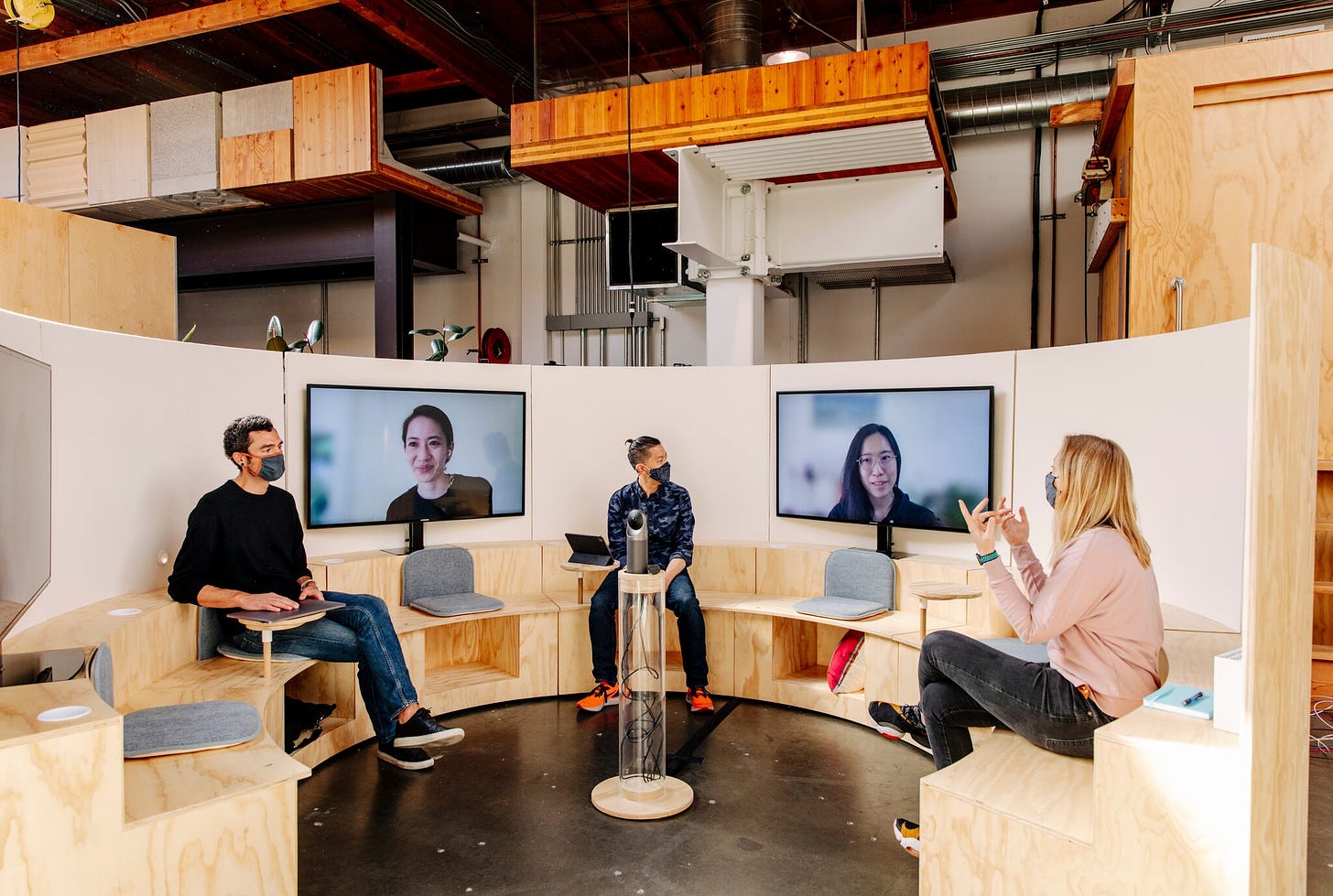Greetings!
Here’s your weekly wrap of the latest technology, innovation, and finance news.
? Blockchain and Crypto
Binance, the world’s largest cryptocurrency exchange, is launching an NFT marketplace set to debut in June.
The premium segment would take a 10% cut from the proceeds of major auctions, Binance said, with 90% going to artists. The day-to-day trading market will charge a 1% “processing fee,” while creators “will continuously receive 1% royalty,” according to Binance.
Zoë Roth, featured in the Disaster Girl meme, has made $500,000 off selling the original copy of her meme as an NFT.

? Alternative Plants
Why grow plants on the land when you can grow them in a lab? An MIT is working on growing plant tissue without growing the trees, an idea similar to cultured meat.
“The way we get these materials hasn’t changed in centuries and is very inefficient,” says Velásquez-García. “This is a real chance to bypass all that inefficiency.”
In other words: “If you want a table, then you should just grow a table.”
? Finance
The general public loves stocks right now. US households increased stockholdings to 41% of their total financial assets in April, the highest level on record. Margin debt is also at record highs.
The enthusiasm for stocks comes as market volatility has been edging lower and the S&P 500 has hit 25 records this year, fueled by a stellar earnings season and the prospect of an economic recovery that is speedier than many predicted. Meanwhile, stimulus checks have fueled a record rise in household incomes, boosting spending and helping propel the recovery.
Cybersecurity firm Darktrace listed on the London Stock Exchange. It rose 43% on its first day.
Founded in 2013 in Cambridge by a group of former intelligence experts and mathematicians, Darktrace uses artificial intelligence to detect and respond to cyberthreats in a business’ IT systems. It raised a total of $230.5 million from investors prior to its IPO, according to Crunchbase.
? Advertising
The digital ad business seems to be going well — Facebook advertising grew 46%, Google advertising grew 32% (and YouTube grew 49%, and is on track to exceed Netflix revenue this year if that continues), Twitter grew 28% (not enough for the market), and Amazon’s new ad business grew 77% and is now generating nearly $7 billion per quarter.
“The advertising team has done a great job of turning clicks into productive sales,” he said. “We’re using new deep learning models to show more relevant sponsored products, we continue to improve the relevancy of the ads being shown on the product detail pages and we’ve seen rapid adoption of the video creative format for sponsored brands, among other things.”
? Working from Home
Atlassian is going all-in on work-from-home.
Under its new “Team Anywhere” policy, Atlassian’s 5700 staff around the world can work from any location in a country where Atlassian has a corporate entity, where they have the legal right to work and where the time zone they are in is broadly aligned with that of their team members.
Google is trying out new office setups to adjust to an increasingly hybrid work world.
The answer seems to be Ikea meets Lego. Instead of rows of desks next to cookie-cutter meeting rooms, Google is designing “Team Pods.” Each pod is a blank canvas: Chairs, desks, whiteboards and storage units on casters can be wheeled into various arrangements, and in some cases rearranged in a matter of hours.
 HSBC expects to cut its office footprint by 20% and its travel budget by 50% in 2021.
HSBC expects to cut its office footprint by 20% and its travel budget by 50% in 2021.
Also, more than 90 new airlines are launching in 2021.
Some entrepreneurs say these conditions are just right for launching a new airline or expanding. In Australia, airline Rex is expanding from regional routes to the major cities in ways that wouldn’t have been possible before the pandemic.
John Sharp, Rex’s deputy chairman, said, “Covid created the opportunity for us to overcome all the barriers that would normally prevent us from doing such a thing.”
? Gaming
Microsoft’s digital store on PC cuts the cut it takes on PC games from 30% to 12%, reducing them from Steam-level pricing (30%) to Epic Games-level pricing (12%). Microsoft’s store doesn’t seem very popular for PC games beyond Microsoft-owned titles like Minecraft and Flight Simulator.
“We want to make sure that we’re competitive in the market,” said Sarah Bond, a Microsoft vice president who leads the gaming ecosystem organization. “Our objective is to have a leading revenue share and really a leading platform.”
⚙️ Mobility
There were more rejiggings in the autonomous car industry, with Toyota buying Lyft’s autonomous car division, Level 5, for $550 million. Level 5 was started in 2017 to develop a self-driving system and is separate from the Motional robotaxi JV that Lyft continues to have with Hyundai Motor Group and Aptiv.
The deal, which is expected to close in the third quarter of 2021, brings to an end Lyft’s four-year journey toward developing and deploying its own self-driving cars.
Alstom SA expects to have its first hydrogen-powered passenger train running on German rails by March 2022.
Alstom has been promoting trains that run on fuel cells for more than five years as an alternative to carbon-emitting diesel engines. In addition to the German project, the world’s second-biggest rail equipment supplier won an order earlier this month from France’s national railroad for a dual hydrogen-electric train and has garnered other contracts in Germany and Italy.
The all-electric Porsche Taycan comes with an optional active safety subscription. It’s not that material (0.5% of the car’s recommended price if the subscription is paid upfront) but may signal a change in how car manufacturers think about their vehicles.
The what, in this case, isn’t as interesting as the how. Taking a cue from Tesla, Porsche is finally treating its 5,000-pound computer like the SAS platform that it is. It’s selling a slightly brighter shade of green like a Netflix subscription or some kind of extra swag in a video game. Get ready to see a lot more of this.
? Batteries
Ford plans to manufacture its own batteries for electric vehicles.
Ford said Tuesday it plans to open a $185 million battery-development center in southeast Michigan next year. The Dearborn, Mich.-based auto maker eventually plans to manufacture its own battery cells, product chief Hau Thai-Tang said during a media call Tuesday.
Janus Energy, an Australian company, plans to test swappable batteries for electric trucks driving between Sydney and Brisbane.
“What we’ve been able to do is create a standard battery form factor that can fit in 90% of trucks. You can liken the model to a swap-and-go gas bottle. You don’t care what gas bottle you get, as long as you get your 9kg of gas. That’s how we’ve designed the system.”
☁️ Cloud Computing
The major cloud vendors all saw significant growth in the quarter; they’re also moving up the stack by making huge investments in AI and higher-level services.
The announcements indicate AWS is doubling its efforts to target industry verticals as part of its strategy and reaching new audiences beyond its core developer and IT communities, such as business leaders and operations executives. In focusing on higher-level services targeting industry and business problems, it is also trying to become more purposeful with the new products it releases.
? Advanced Materials
3D printing a house can cost half as much and take half the time.
And unlike traditional homes, which can take weeks or even months to frame out, the walls and foundation of a 3D-printed home can be ready in as little as two days, with only a three or four person crew. All of these factors brings the production costs of a 3D-printed house down to as little as $4,000 per unit.
A Dutch couple have become Europes’s first tenants of a fully 3D-printed house.
This house in Italy took 200 hours to 3D-print from local soil.
? Biology and Pest Control
Scientists are about to unleash 500 million gene-hacked mosquitoes in Florida to breed out the existing non-gene-hacked mosquito population.
Oxitec says the mosquitoes, all males — which don’t bite humans — will then breed with wild females, which do bite. But they’ll pass on the OX5034 gene, a hereditary payload that prevents any female offspring from reaching adulthood. The theory is that the more the gene-hacked mosquitoes and their descendants reproduce, the fewer biting female mosquitoes there will be in the area.
? Mouse Health
Good news for the mice in the audience; new “smart” immune cells can be programmed to shrink brain and ovarian tumours (see the paper).
His team is also getting the therapies used in the mice ready for human trials, which could take a couple of years. These trials will involve removing a patient’s immune cells and genetically engineering them before putting them back in the body. In the longer term, it may be possible to treat people using “off-the-shelf” cells, which would greatly reduce costs.
? Health
A failing heart transplant is a dangerous thing. A new DNA-based blood test provides an early warning sign (see the paper).
The test looks promising, but long-term clinical utility studies are needed to evaluate how treatments based on test results fare, says University of British Columbia medical researcher Scott Tebbutt, who was not part of the study. Noninvasive tests are invaluable, Tebbutt says, and “reducing the number of biopsies even by half is a significant improvement to the quality of the patients’ lives.”
? Artificial Intelligence
Researchers are using machine learning to listen to the birds and the bats.
“Machine learning has been the big game changer for us,” says Laurel Symes, assistant director of the Cornell Lab of Ornithology’s Center for Conservation Bioacoustics. She studies acoustic communication in animals, including crickets, frogs, bats and birds, and has amassed many months of recordings of katydids (famously vocal long-horned grasshoppers that are an essential part of the food web) in the rain forests of central Panama. Patterns of breeding activity and seasonal population variation are hidden in this audio, but analyzing it is enormously time-consuming: it took Symes and three of her colleagues 600 hours of work to classify various katydid species from just 10 recorded hours of sound. But a machine-learning algorithm her team is developing, called KatydID, performed the same task while its human creators “went out for a beer,” Symes says.
? Regulation
The EU has determined that Apple’s App Store breaks competition rules concerning Spotify’s complaint from 2019.
“Our preliminary finding is that Apple exercises considerable market power in the distribution of music streaming apps to owners of Apple devices. On that market, Apple has a monopoly,” Margrethe Vestager, the head of competition policy in the EU, said in a press conference.
Apple’s court battle with Epic Games over the App Store starts this week.
?️ Space
China launched the main module of its permanent space station into space.
The core module is the section of the station where astronauts will live for up to six months at a time. Another 10 launches will send up two more modules where crews will conduct experiments, four cargo supply shipments and four missions with crews.
Deep fakes aren’t just limited to people — some geographers are now concerned about deep fake geography (see the paper).
For Zhao, though, the most important thing is to raise awareness so geographers aren’t caught off-guard. As he and his colleagues write: “If we continue being unaware of an unprepared for deep fake, we run the risk of entering a ‘fake geography’ dystopia.”
From June 2010 to November 2011, a crew of six people lived in confinement for 520 days to simulate a crewed mission to Mars. A new study using new techniques shows the confinement led to significant changes in the participants’ gut bacteria (see the paper).
The Guardian asks whether Richard Branson’s Virgin Galactic will ever take off.
As yet, they have only returned to space once and are still testing. A temporary stall? Or have the costs of this undertaking finally caught up with Branson?
⚡ Other Snippets
The New Yorker wrote a long piece on how the Pentagon started taking UFOs seriously.
The US Army’s new upgraded night-vision goggles tech looks like it comes out of a movie.
Known as the Enhanced Night Vision Goggle-Binocular—or ENVG-B, for short—the new goggles were designed to vastly improve a soldier’s ability to not only see what is going on all around them under any lighting conditions but to also be able to accurately discern what they’re seeing.
 Lancer Brigade @lancer_brigade
Lancer Brigade @lancer_brigadeApril 22nd 2021
1,032 Retweets3,407 Likes
Netflix added a “play something” feature that lets you mindlessly scroll through shows, just like traditional TV.
Pfizer is testing an oral pill designed to treat COVID-19 that CEO Albert Bourla described as a “game-changer.”
The “end of the year” is a reasonable time frame for availability to the public, Bourla said, but it depends on the success of clinical trials and approval by the Food and Drug Administration.
Have a great week,
Thomas






